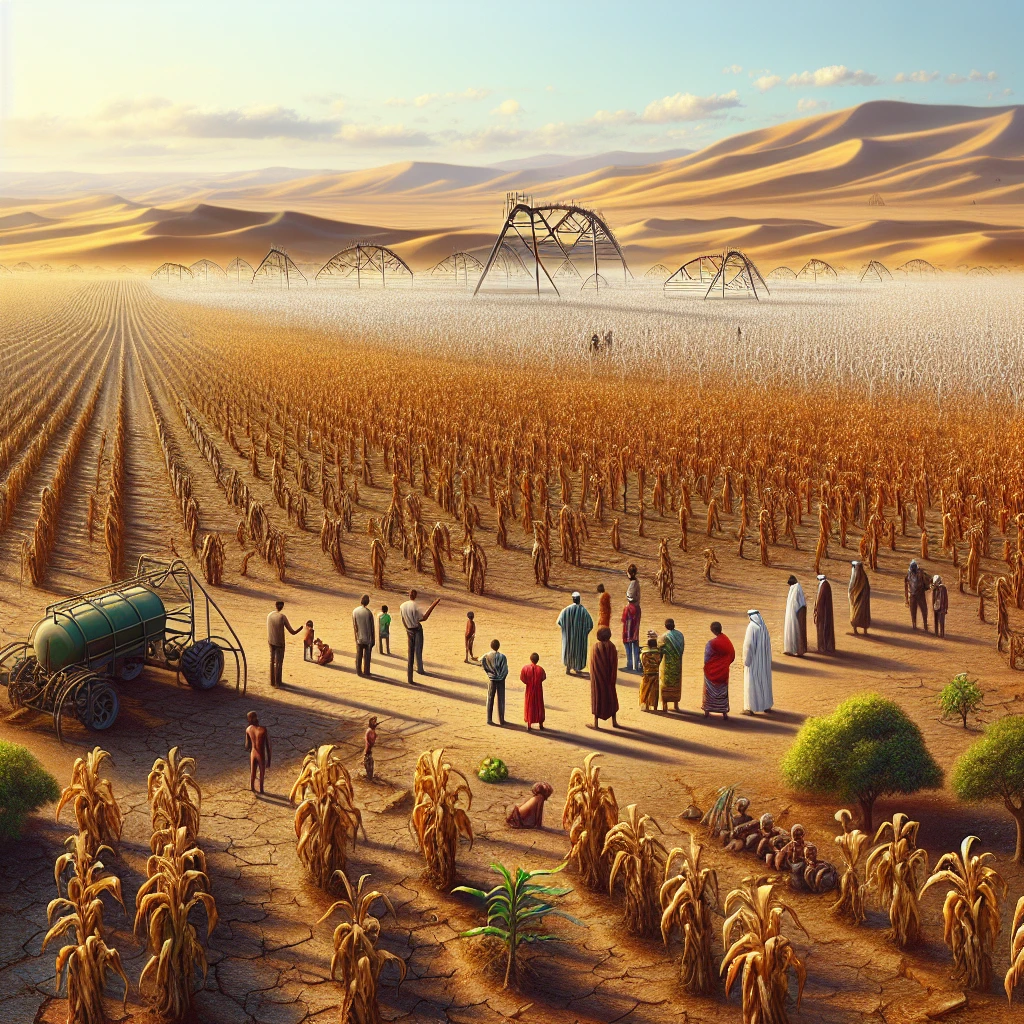

The food crisis in Africa is a situation where many people in Africa lack access to enough food for an active and healthy life. It is important to understand the causes of the food crisis in Africa in order to address the root issues and find effective solutions to improve food security in the region.
The causes of the food crisis in Africa are complex and are influenced by factors such as climate change, conflict, debt, and economic instability.
Check out this Youtube video: Get a deeper understanding of the causes of food crisis in Africa and the surge in hunger crisis affecting 346 million people.
Economic Factors
The impact of poverty on access to food is undeniable. In many African countries, poverty leads to food insecurity, making it difficult for people to access enough nutritious food.
This results in malnutrition, particularly among children, which significantly impacts their health and well-being. The lack of financial resources prevents individuals and families from accessing quality food, exacerbating the cycle of poverty and food insecurity.
Inequality in land distribution and ownership further compounds the food crisis in Africa. The unequal distribution of land often leads to political and economic disparities, with elite control over resources contributing to income and asset inequalities.
Moreover, unequal land ownership perpetuates historical imbalances and hinders the development of institutions promoting human capital. The connection between land inequality and income disparities underscores the profound impact of unequal land distribution on the food crisis in Africa.
The intertwining issues of poverty and land inequality underscore the complex web of challenges contributing to the food crisis in Africa. Addressing these economic factors is crucial in formulating sustainable solutions to ensure food security and equitable access to resources across the continent.
Political Factors
Corruption in the distribution of food aid is a major contributor to the food crisis in Africa. Mismanagement and embezzlement of resources intended for food aid have led to inadequate distribution, leaving many vulnerable populations without access to essential nutrition.
This corruption, including bribery and extortion, undermines the effectiveness of food aid programs and exacerbates food insecurity. Conflict and instability in several African regions have directly resulted in food shortages.
Ongoing conflicts disrupt agricultural activities, leading to the destruction of crops and livestock, and impede access to crucial resources. Instability also hinders the distribution of aid and essential supplies, exacerbating the already dire food crisis.
Environmental Factors
Climate change has a significant impact on agriculture, affecting crops, livestock, soil, and water resources. Increased temperatures and changes in precipitation patterns can impede crop growth, reduce yields, and negatively impact soil quality.
Additionally, extreme weather events such as floods and droughts can harm crops and lead to substantial reductions in agricultural productivity.
Drought and desertification also contribute to food crises in Africa. Reduced water availability in soils results in significant declines in crop and livestock productivity, leading to scarcity of water supplies for irrigation and livestock watering.
Desertification, driven by human activities like deforestation and overexploitation of aquifers, is exacerbated by climate change-induced extreme weather phenomena, such as droughts, hurricanes, and wildfires, further impacting agricultural output.
| Climate Change | Drought and Desertification |
|---|---|
| Impedes crop growth and reduces yields | Leads to reduced water availability for irrigation and livestock |
| Harms soil quality and water resources | Drives desertification due to human activities |
| Exacerbates extreme weather events | Increases scarcity of water supplies |
Agricultural Factors
Lack of modern farming technology
The lack of modern farming technology in Africa significantly hinders agricultural productivity. Many farmers in Africa still rely on traditional farming methods, which are often inefficient and yield lower output.
The limited access to modern tools, machinery, and improved seeds exacerbates the food crisis in the region. For instance, the utilization of outdated farming implements instead of modern machinery leads to lower crop yields and hampers overall agricultural development.
Decline in soil fertility
The decline in soil fertility in Africa poses a critical challenge to sustainable agricultural practices. Factors such as inadequate fertilizer use, continuous cropping systems, and soil erosion contribute to the depletion of soil nutrients.
The impact of soil degradation not only diminishes crop yields but also jeopardizes the long-term viability of agricultural lands. Lack of proper cropping systems and inadequate soil management exacerbate the food crisis by limiting the ability to cultivate nutritious and sufficient crops.
Social Factors
Rapid population growth in Africa is a significant contributing factor to the food crisis. The exponential increase in population puts immense pressure on the already limited food resources, leading to scarcity and inadequate distribution.
As the population continues to grow, the demand for food surpasses the supply, exacerbating the food crisis in the region.
Gender inequality in access to food resources further amplifies the food crisis in Africa. Discriminatory gender norms and practices result in women and girls being more vulnerable to hunger and malnutrition.
Access to essential resources such as land, knowledge, and sociocultural inputs is often limited for women, hindering their ability to secure adequate food. This inequality perpetuates the cycle of poverty and exacerbates food insecurity in the region.
| Gender Gap Statistics in Food Insecurity |
|---|
| Women affected by anemia: 571 million |
| Women moderately or severely food insecure: 31.9% |
| Men moderately or severely food insecure: 27.6% |
Health Factors
Impact of diseases on food production
Diseases such as plant pathogens and pests significantly impact food production in Africa, leading to reduced crop yields and economic losses. For example, the invasion of the fall armyworm in maize crops has caused extensive damage, threatening food security for millions of people in the region.
Malnutrition and its effects on food crisis
Malnutrition plays a critical role in exacerbating the food crisis in Africa. It leads to a higher susceptibility to diseases, especially among children, and hinders physical and cognitive development.
The prevalence of undernutrition and deficiencies in essential vitamins and minerals further compounds the challenges faced in addressing the food crisis.
Trade Factors
The Impact of international trade policies on African food production is profound. Trade policies heavily influence the agricultural sector’s productivity, affecting the availability and accessibility of food within the continent.
For instance, tariffs or quotas on agricultural imports can limit access to crucial resources, impacting food production and supply. Additionally, trade agreements and regulations can either foster or hinder the growth of the agricultural sector, thereby influencing food production levels.
The Dependency on food imports exacerbates food crises in Africa. Reliance on imported food makes African countries especially vulnerable to external shocks, such as global price fluctuations, supply chain disruptions, and trade barriers.
This dependency undermines the ability of African nations to achieve food security and self-sufficiency, as it contributes to heightened food insecurity and economic vulnerability.
| Impact of International Trade Policies | Dependency on Food Imports |
|---|---|
| – Influence on agricultural productivity | – Exacerbates food crises |
| – Implications of tariffs and quotas | – Vulnerability to external shocks |
| – Role of trade agreements and regulations | – Limitation of self-sufficiency |
The interplay of international trade policies and food import dependency significantly influences the food crisis in Africa, necessitating strategic interventions to address these critical factors.
Historical Factors
Impact of colonialism on African food systems
Colonialism in Africa significantly disrupted traditional food production and distribution systems. The colonial authorities imposed export-oriented agricultural policies, leading to a shift from local food production to growing cash crops for export.
This resulted in food shortages and a decline in traditional mixed production systems. The focus on export crops to meet the demands of the colonizing countries rather than ensuring food security for the local populations exacerbated the vulnerability of African food systems.
Post-colonial agricultural policies and their effects
Post-colonial agricultural policies in Africa struggled to undo the damage caused by colonialism. Despite efforts to promote domestic food production, the legacy of export-oriented agriculture persisted.
The post-colonial governments faced challenges in reversing the emphasis on cash crops, affecting food security and the livelihoods of farmers. The orientation toward export-oriented agriculture during colonial rule resulted in prolonged ramifications, influencing the agricultural policies and welfare of African nations post-independence.
| Impact of Colonialism | Post-Colonial Policies |
|---|---|
| Disrupted traditional food production | Struggled to promote domestic food production |
| Shifted to export-oriented agriculture | Faced challenges in reversing the emphasis on cash crops |
| Led to food shortages | Prolonged the legacy of export-oriented agriculture |
Cultural Factors
Traditional food practices and their impact on food crisis
Traditional food practices in Africa have a significant impact on the continent’s food crisis. The reliance on monoculture crops and the neglect of indigenous, drought-resistant crops have led to a lack of dietary diversity and vulnerability to climate change, exacerbating the food crisis.
For example, the overemphasis on maize cultivation has made food supply susceptible to crop failures, impacting food security.
Influence of globalization on African food consumption patterns
Globalization has had a profound influence on African food consumption patterns. The influx of processed and fast foods, alongside the decline of traditional dietary practices, has resulted in a shift towards less nutritious and more calorie-dense diets.
Additionally, the reliance on imported foods has diminished the demand for indigenous crops, further contributing to the food crisis in Africa. For instance, the increased availability of cheap, processed foods has led to a decrease in the consumption of locally-grown, nutrient-rich foods.
Education Factors
Sustainable farming practices play a crucial role in addressing the food crisis in Africa. The lack of education on sustainable farming practices contributes significantly to the challenges faced in food production.
Without adequate knowledge of sustainable agriculture, farmers may inadvertently deplete soil fertility, exacerbate water scarcity, and increase agricultural waste and runoff, which further intensifies the food crisis.
Agricultural education holds immense importance in mitigating the food crisis in Africa. Educating local farmers on sustainable agricultural practices, crop diversity, soil health preservation, and environmental stewardship can lead to long-term solutions.
By increasing access to education on sustainable farming techniques, communities can improve food production, protect vital resources, and enhance the overall quality of life, thus addressing the root causes of the food crisis.
| Benefits of Education in Agriculture | Impact |
|---|---|
| Improved sustainable farming practices | Preserves soil fertility and water resources |
| Enhanced crop diversity | Promotes environmental stewardship |
| Soil and water resource protection | Supports long-term food security |
Humanitarian Factors
Role of international aid organizations in addressing food crisis
In addressing the food crisis in Africa, international aid organizations play a critical role in providing essential humanitarian assistance to vulnerable communities. Organizations like the World Food Programme and the United Nations aim to rapidly support those facing food insecurity through the provision of emergency cash, vouchers, and in-kind food assistance.
These efforts also include nutrition considerations to ensure the overall well-being of the affected populations. The World Bank is also actively involved, supporting production, facilitating trade in food and production inputs, and investing in sustainable food security to tackle the escalating crisis.
Challenges in humanitarian aid distribution in Africa
The distribution of humanitarian aid in Africa faces numerous challenges, hindering efficient assistance delivery. Conflict and war-torn areas often obstruct the smooth flow of aid, impacting vulnerable populations.
Organizations like the International Committee of the Red Cross (ICRC) struggle with responding to complex needs and designing sustainable solutions to reduce dependency on humanitarian aid. Additionally, the continent has encountered difficulties in vaccine distribution, particularly during the COVID-19 pandemic, reflecting the broader challenges in ensuring equitable access to essential resources.
| Challenges in Humanitarian Aid Distribution |
|---|
| Conflict and War-Torn Areas |
| Vaccine Distribution Challenges |
While international aid organizations play a vital role in addressing the food crisis in Africa, challenges persist in ensuring effective aid distribution, requiring ongoing efforts to overcome barriers and provide support to those in need.
Technology Factors
Potential of technology in addressing food crisis
The potential of technology in addressing the food crisis is vast. For instance, advanced technologies like biosensors, wireless connectivity, and machine learning algorithms can be integrated into a powerful data collection, sharing, and analysis network.
This integration allows for the monitoring and improvement of the food supply chain from the farm to the table. Additionally, smart agricultural technology has the potential to significantly increase food production while mitigating its impact on the climate and environment.
Access to affordable and sustainable agricultural technology
Access to affordable and sustainable agricultural technology is crucial in combating the food crisis in Africa. For example, digital agriculture systems can be instrumental in reducing food waste at every stage of the supply chain.
Moreover, affordable and sustainable technologies such as advanced sensors, multi-access edge computing (MEC), fifth-generation networking (5G), and artificial intelligence (AI) can transform food production, making it more efficient and sustainable.
Recommended Amazon Products for Addressing Food Crisis in Africa
Here’s a curated list of products that can help in addressing the food crisis in Africa. These recommendations are based on their relevance to the causes of the food crisis mentioned in the article.
Water Purification Tablets
Water purification tablets are essential for ensuring access to clean and safe drinking water in areas affected by drought and desertification.
Pros and Cons
| Pros | Cons |
|---|---|
| Purifies water quickly | May alter the taste of water |
| Affordable and portable | May not remove all contaminants |
| Can be used in emergency situations |
Solar-Powered Flashlights
Solar-powered flashlights can be beneficial in areas where access to electricity is limited, helping farmers work during the night and improving safety and security.
Pros and Cons
| Pros | Cons |
|---|---|
| Environmentally friendly | Initial cost may be high |
| Renewable energy source | Dependent on sunlight for charging |
| Long-term cost savings |
Drought-Resistant Seeds
Drought-resistant seeds can be a crucial tool in combating the effects of climate change on agriculture, improving crop yields in areas with erratic rainfall patterns.
Pros and Cons
| Pros | Cons |
|---|---|
| Increased resilience to climate change | Limited availability of certain crops |
| Higher likelihood of successful harvests | Initial investment may be higher |
| Reduced water consumption |
Portable Grain Mills
Portable grain mills can aid in addressing the decline in soil fertility by enabling farmers to process grain and produce their own flour, reducing dependency on imports.
Pros and Cons
| Pros | Cons |
|---|---|
| Empowers local farmers | Requires physical effort to operate |
| Adds value to grain produce | Initial cost of equipment |
| Increases food security |
Agricultural Training Kits
Agricultural training kits can provide education on sustainable farming practices, empowering farmers to improve crop yield and soil fertility.
Pros and Cons
| Pros | Cons |
|---|---|
| Enhances farming knowledge | May require language translation |
| Offers practical training | Initial investment may be high |
| Can be used for community education |
Top Recommended Product for Addressing Food Crisis in Africa
If you’re looking for the best solution for addressing the food crisis in Africa, we highly recommend Drought-Resistant Seeds available on Amazon](https://www.amazon.com/s?k=drought+resistant+seeds). Drought-resistant seeds are a crucial tool in combating the effects of climate change on agriculture, improving crop yields in areas with erratic rainfall patterns. Ready to make a difference? Check out Drought-Resistant Seeds on Amazon today for the best results!


Conclusion
The causes of food crisis in Africa are multi-faceted and interconnected. Factors such as climate change, natural disasters, and droughts have significantly impacted agricultural productivity and food security in the region.
Additionally, political instability, armed conflicts, and ineffective governance have hindered access to food and disrupted supply chains, exacerbating the crisis further. Furthermore, poverty, lack of access to education, and limited infrastructure have also contributed to the persistence of food insecurity in many African countries.
Addressing the root causes of food crisis in Africa requires a comprehensive and multi-sectoral approach. Efforts to mitigate the impact of climate change, strengthen governance systems, and resolve conflicts are essential in promoting food security across the continent.
Moreover, investing in educational opportunities, poverty alleviation programs, and infrastructure development can help build resilience and enhance food production capabilities in African communities. Collaborative and sustainable solutions are needed to effectively address the complex challenges underlying the food crisis in Africa and ensure a more secure and prosperous future for its people.



